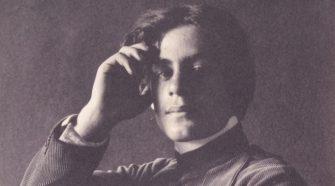Several years just flew by and there’s even fewer days left to live for — does it feel like you’re falling further and further behind your goals?
Unfinished and half-baked work, mindless wasteful time spent on the internet and never following through on what you set out to do everyday. It’s a struggle. A painful struggle to do better but always, somehow still falling behind in our daily routine.
Maybe, you feel like you can do so much better, you know deep down inside that you can share so much more with the world. I also share this struggle with you.
We watch those with natural talent and genius realize their potential and share great work with the world. We secretly wish we were born like them and wonder if by some miracle, we could possibly perform at their level and create great work — but how will we ever know if we don’t first realize our own potential?
And is there a way for you to unleash this hidden potential — if so how can you do this effectively?
Yes, the top one percent of performers in any field are usually born with natural talent but, that’s only one half the equation. When we study them carefully, we notice a common pattern across the board — an incredibly efficient daily routine that keeps them miles ahead of the pack throughout their lifetime.
As you read the rest of this article, you will discover and uncover the best daily routines of some of the most famous writers that have ever existed. You will learn how you can develop and use these routines in your own life to make steady progress everyday and consistently follow through on what you set out to do.
At the end of this article, there’s a quick summary of the key common traits and practical takeaways from these famous writers.
If you’re strapped for time you can bookmark this page to read the routines later and skip straight to these bite-sized strategies now.
Let’s get started….
Stephen King: “I try to get six pages a day”


Best-selling thriller writer, Stephen King, has penned over 50 novels and sold over 350 million copies in a career that spans over 40 years.
In an interview with Game Of Thrones Author, George R.R. Martin, Martin asks Stephen King how he writes so fast and gets so much work done.
Here’s an excerpt from the interview at 50:29:
Martin: How the f@!% do you write so many books so fast? I think, “Oh, I’ve had a really good six months, I’ve finished three chapters.” And you’ve finished three books in that time.
King: Here’s the thing, okay? There are books, and there are books. The way that I work, I try to get out there and I try to get six pages a day. So, with a book like End of Watch, and … when I’m working I work every day — three, four hours, and I try to get those six pages, and I try to get them fairly clean. So if the manuscript is, let’s say, 360 pages long, that’s basically two months work. … But that’s assuming it goes well.
Martin: And you do hit six pages a day?
King: I usually do.
Martin: You don’t ever have a day where you sit down there and it’s like constipation? And you write a sentence and you hate the sentence, and you check your email and you wonder if you had any talent after all? And maybe you should have been a plumber? (Laughs) Don’t you have days like that?
King: No. I mean, there’s real life, I could be working away, and something comes up and you have to get up … but mostly I try to get the six pages in.
In case your wandering, Stephen King’s morning routine usually looks something like this…
“I have a glass of water or a cup of tea. There’s a certain time I sit down, from 8:00 to 8:30, somewhere within that half hour every morning,” he explained. “I have my vitamin pill and my music, sit in the same seat, and the papers are all arranged in the same places…The cumulative purpose of doing these things the same way every day seems to be a way of saying to the mind, you’re going to be dreaming soon.”
(Source: Lisa Rogak, Haunted Heart: The Life and Times of Stephen King)
Haruki Murakami: “The repetition itself becomes the important thing.”

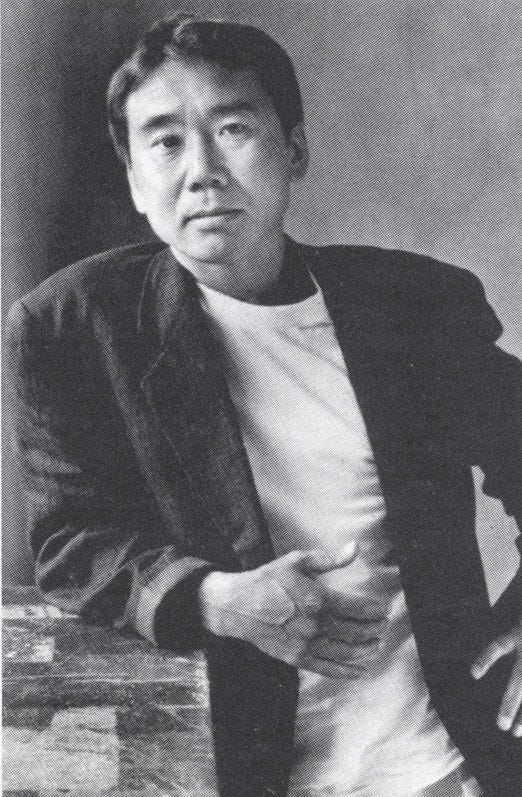
In a 2004 Paris review interview with John Wray, Murakami, regarded as one of the world’s greatest living novelists by the guardian, reveals his daily routine and habits for success…
When I’m in writing mode for a novel, I get up at four a.m. and work for five to six hours. In the afternoon, I run for ten kilometers or swim for fifteen hundred meters (or do both), then I read a bit and listen to some music. I go to bed at nine p.m.
I keep to this routine every day without variation. The repetition itself becomes the important thing; it’s a form of mesmerism. I mesmerize myself to reach a deeper state of mind.
But to hold to such repetition for so long — six months to a year — requires a good amount of mental and physical strength. In that sense, writing a long novel is like survival training. Physical strength is as necessary as artistic sensitivity.
Susan Sontag: “I will tell people not to call in the morning.”


In her 1977 diary, Susan Sontag, critical essayist, novelist and writer of ‘On Photography,’ reveals her private resolutions that helped her stick to her daily writing habits.
Starting tomorrow — if not today:
I will get up every morning no later than eight. (Can break this rule once a week.)
I will have lunch only with Roger [Straus]. (‘No, I don’t go out for lunch.’ Can break this rule once every two weeks.)
I will write in the Notebook every day. (Model: Lichtenberg’s Waste Books.)
I will tell people not to call in the morning, or not answer the phone.
I will try to confine my reading to the evening. (I read too much — as an escape from writing.)
I will answer letters once a week. (Friday? — I have to go to the hospital anyway.)
WH Auden: “Routine, in an intelligent man, is a sign of ambition”
1948 Pulitzer prize winner, WH Auden is widely regarded as one of the twentieth century’s greatest poets, gives us a sneak peek into his strategies for better habits, unleashing creative genius and his powerful daily routine…
“Routine, in an intelligent man, is a sign of ambition,” Auden wrote in 1958. If that’s true, then Auden himself was one of the most ambitious men of his generation. The poet was obsessively punctual and lived by an exacting timetable throughout his life. “He checks his watch over and over again,” a guest of Auden’s once noted. “Eating, drinking, writing, shopping, crossword puzzles, even the mailman’s arrival–all are timed to the minute and with accompanying routines.”
Auden believed that a life of such military precision was essential to his creativity, a way of taming the muse to his own schedule. “A modern stoic,” he observed, “knows that the surest way to discipline passion is to discipline time: decide what you want or ought to do during the day, then always do it at exactly the same moment every day, and passion will give you no trouble.”
Auden rose shortly after 6:00 a.m., made himself coffee, and settled down to work quickly, perhaps after taking a first pass at the crossword. His mind was sharpest from 7:00 until 11:30 a.m., and he rarely failed to take advantage of these hours. (He was dismissive of night owls: “Only the ‘Hitlers of the world’ work at night; no honest artist does.”) Auden usually resumed his work after lunch and continued into the late afternoon. Cocktail hour began at 6:30 sharp, with the poet mixing himself and any guests several strong vodka martinis. Then dinner was served, with copious amounts of wine, followed by more wine and conversation. Auden went to bed early, never later than 11:00 and, as he grew older, closer to 9:30.
(Source: Daily Rituals)
E.B. White: “A writer who waits for ideal conditions under which to work will die without putting a word on paper.”
In a 1969 Paris review interview, E.B. White, the famous author of one the best children’s books of all time, Charlotte’s Web, shares his strategies for dealing with distractions and sticking to his daily writing routine…
I never listen to music when I’m working. I haven’t that kind of attentiveness, and I wouldn’t like it at all. On the other hand, I’m able to work fairly well among ordinary distractions. My house has a living room that is at the core of everything that goes on: it is a passageway to the cellar, to the kitchen, to the closet where the phone lives. There’s a lot of traffic. But it’s a bright, cheerful room, and I often use it as a room to write in, despite the carnival that is going on all around me.
In consequence, the members of my household never pay the slightest attention to my being a writing man — they make all the noise and fuss they want to. If I get sick of it, I have places I can go. A writer who waits for ideal conditions under which to work will die without putting a word on paper.
Hi, I’d like to give you a free guide to stop procrastinating, avoid distractions and finally focus on what matters most. Click here to get the guide immediately.
Ernest Hemingway: “I write every morning.”

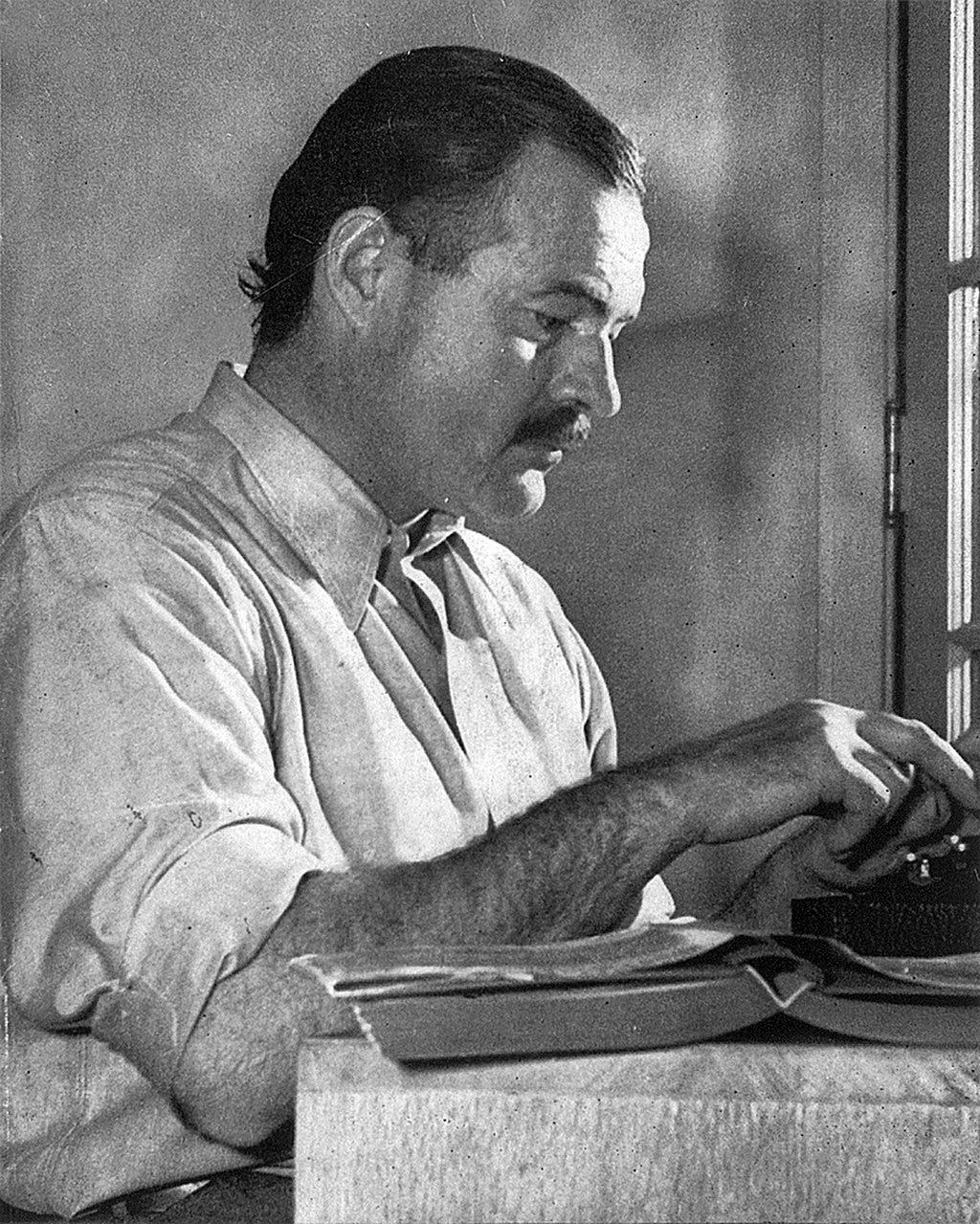
In a 1954 interview, Ernest Hemingway, Nobel Prize winner and novelist, known for his great works including A Farewell to Arms and The Old Man and the Sea, finally opens up about his real daily routine…
When I am working on a book or a story I write every morning as soon after first light as possible. There is no one to disturb you and it is cool or cold and you come to your work and warm as you write.
You read what you have written and, as you always stop when you know what is going to happen next, you go on from there. You write until you come to a place where you still have your juice and know what will happen next and you stop and try to live through until the next day when you hit it again. You have started at six in the morning, say, and may go on until noon or be through before that.
When you stop you are as empty, and at the same time never empty but filling, as when you have made love to someone you love. Nothing can hurt you, nothing can happen, nothing means anything until the next day when you do it again. It is the wait until the next day that is hard to get through.
Maya Angelou: “I try to get there around 7, and I work until 2 in the afternoon.”


Maya Angelou was a writer, poet, civil rights activist and award-winning author known for her acclaimed memoir, I Know Why the Caged Bird Sings, which made literary history as the first nonfiction best-seller by an African-American woman.
In the book, Daily Rituals (audiobook), Angelou describes her daily routine and schedule in detail from morning till night.
I usually get up at about 5:30, and I’m ready to have coffee by 6, usually with my husband. He goes off to his work around 6:30, and I go off to mine.
I keep a hotel room in which I do my work — a tiny, mean room with just a bed, and sometimes, if I can find it, a face basin. I keep a dictionary, a Bible, a deck of cards and a bottle of sherry in the room. I try to get there around 7, and I work until 2 in the afternoon.
If the work is going badly, I stay until 12:30. If it’s going well, I’ll stay as long as it’s going well. It’s lonely, and it’s marvelous. I edit while I’m working. When I come home at 2, I read over what I’ve written that day, and then try to put it out of my mind.
I shower, prepare dinner, so that when my husband comes home, I’m not totally absorbed in my work. We have a semblance of a normal life. We have a drink together and have dinner. Maybe after dinner I’ll read to him what I’ve written that day. He doesn’t comment. I don’t invite comments from anyone but my editor, but hearing it aloud is good. Sometimes I hear the dissonance; then I try to straighten it out in the morning.
Kurt Vonnegut: “I do pushups and sit ups all the time”
In 1965, Kurt Vonnegut, famous American Author known for novel, Slaughterhouse-five, wrote a letter to his wife, Jane, where he reveals his morning routine and daily writing habits.
I awake at 5:30, work until 8:00, eat breakfast at home, work until 10:00, walk a few blocks into town, do errands, go to the nearby municipal swimming pool, which I have all to myself, and swim for half an hour, return home at 11:45, read the mail, eat lunch at noon. In the afternoon I do schoolwork, either teach of prepare.
When I get home from school at about 5:30, I numb my twanging intellect with several belts of Scotch and water ($5.00/fifth at the State Liquor store, the only liquor store in town. There are loads of bars, though.), cook supper, read and listen to jazz (lots of good music on the radio here), slip off to sleep at ten.
I do push ups and sit ups all the time, and feel as though I am getting lean and sinewy, but maybe not.
John Steinbeck: “Lose track of the 400 pages and write just one page for each day”
In 1962, American Novelist and Nobel Prize winner, John Steinbeck wrote a letter to his friend revealing his six best strategies for productivity, beating procrastination and to “keep from going nuts.”
Now let me give you the benefit of my experience in facing 400 pages of blank stock — the appalling stuff that must be filled. I know that no one really wants the benefit of anyone’s experience which is probably why it is so freely offered. But the following are some of the things I have had to do to keep from going nuts.
1. Abandon the idea that you are ever going to finish. Lose track of the 400 pages and write just one page for each day; it helps. Then when it gets finished, you are always surprised.
2. Write freely and as rapidly as possible and throw the whole thing on paper. Never correct or rewrite until the whole thing is down. Rewrite in process is usually found to be an excuse for not going on. It also interferes with flow and rhythm which can only come from a kind of unconscious association with the material.
3. Forget your generalized audience. In the first place, the nameless, faceless audience will scare you to death and in the second place, unlike the theatre, it doesn’t exist. In writing, your audience is one single reader. I have found that sometimes it helps to pick out one person — a real person you know, or an imagined person and write to that one.
4. If a scene or a section gets the better of you and you still think you want it — bypass it and go on. When you have finished the whole you can come back to it and then you may find that the reason it gave trouble is because it didn’t belong there.
5. Beware of a scene that becomes too dear to you, dearer than the rest. It will usually be found that it is out of drawing.
6. If you are using dialogue — say it aloud as you write it. Only then will it have the sound of speech.
— From a letter to Robert Wallsten,
February, 1962
Ray Bradbury: “Write a short story every week. It’s not possible to write 52 bad short stories in a row….before you go to bed every night, read one short story.”
In a 2001 keynote address, Ray Bradbury, fantasy and horror author best known for his novel Fahrenheit 451, shared stories and crucial lessons from his writing life on how to hone ones craft.
“The problem with novels is that you can spend a whole year writing one and it might not turn out well because you haven’t learned to write yet. But the best hygiene for beginning writers or intermediate writers is to write a hell of a lot of short stories. If you can write one short story a week — it doesn’t matter what the quality is to start — but at least you’re practicing and at the end of the year you have 52 short stories and I defy you to write 52 bad ones. It can’t be done.(2.50)
“I’ll give you a programme to follow every night. Very simple programme. For the next thousand nights, before you go to bed every night, read one short story. That will take you ten minutes, fifteen minutes…for the next 1,000 nights.”(8.30)
Alice Munro: “I have a quota of pages.”
In a 1994 Paris Review interview, Alice Munro, Nobel prize winner and critically well-regarded Canadian short-story writer shares her daily work habits and goal setting strategies.
I write every morning, seven days a week. I write starting about eight o’clock and finish around eleven….I am so compulsive that I have a quota of pages. I’m also compulsive now about how much I walk every day….
Three miles every day, so if I know I’m going to miss a day, I have to make it up. I watched my father go through this same thing. You protect yourself by thinking if you have all these rituals and routines then nothing can get you.
Simone de Beauvoir: “I see my friends”


In a 1965 Paris Review interview, Simone de Beauvoir, French writer, intellectual and existentialist philosopher, shares her strategy for work-life balance in her daily routine.
“I first have tea and then, at about ten o’clock, I get under way and work until one. Then I see my friends and after that, at five o’clock, I go back to work and continue until nine. I have no difficulty in picking up the thread in the afternoon.”
In the evening,…went to the movies …and listened to the radio at Beauvoir’s apartment (Source: Daily Rituals (audiobook)
John Updike:“I try to stay with it even on dull days”
In a 1994 Paris Review interview, John Updike, one of only three writers to win the Pulitzer Prize for Fiction more than once, shares some tips on how to stay motivated even when you get bored doing work.
I write every weekday morning. I try to vary what I am doing, and my verse, or poetry, is a help here. Embarked on a long project, I try to stay with it even on dull days.
For every novel, however, that I’ve published, there has been one left unfinished or scrapped. Some short stories… are fragments salvaged and reshaped…. In the execution there has to be a ‘happiness’ that can’t be willed or foreordained. It has to sing, click, something.”
Henry Miller: “When you can’t create you can work.”
In 1932, the famous writer and painter, Henry Miller, reveals his “11 commandments” that helped him stick to his work schedule and daily routine for many years.
1. Work on one thing at a time until finished.
2. Start no more new books, add no more new material to “Black Spring.”
3. Don’t be nervous. Work calmly, joyously, recklessly on whatever is in hand.
4. Work according to Program and not according to mood. Stop at the appointed time!
5. When you can’t create you can work.
6. Cement a little every day, rather than add new fertilizers.
7. Keep human! See people, go places, drink if you feel like it.
8. Don’t be a draught-horse! Work with pleasure only.
9. Discard the Program when you feel like it — but go back to it next day. Concentrate. Narrow down. Exclude.
10. Forget the books you want to write. Think only of the book you are writing.
11. Write first and always. Painting, music, friends, cinema, all these come afterwards.
(Source: Henry Miller On Writing)
Here are even more famous daily rituals and routines from the book, Daily Rituals: How Great Minds Make Time, Find Inspiration, and Get to Work (Audiobook).
Leo Tolstoy:“I must write each day without fail”

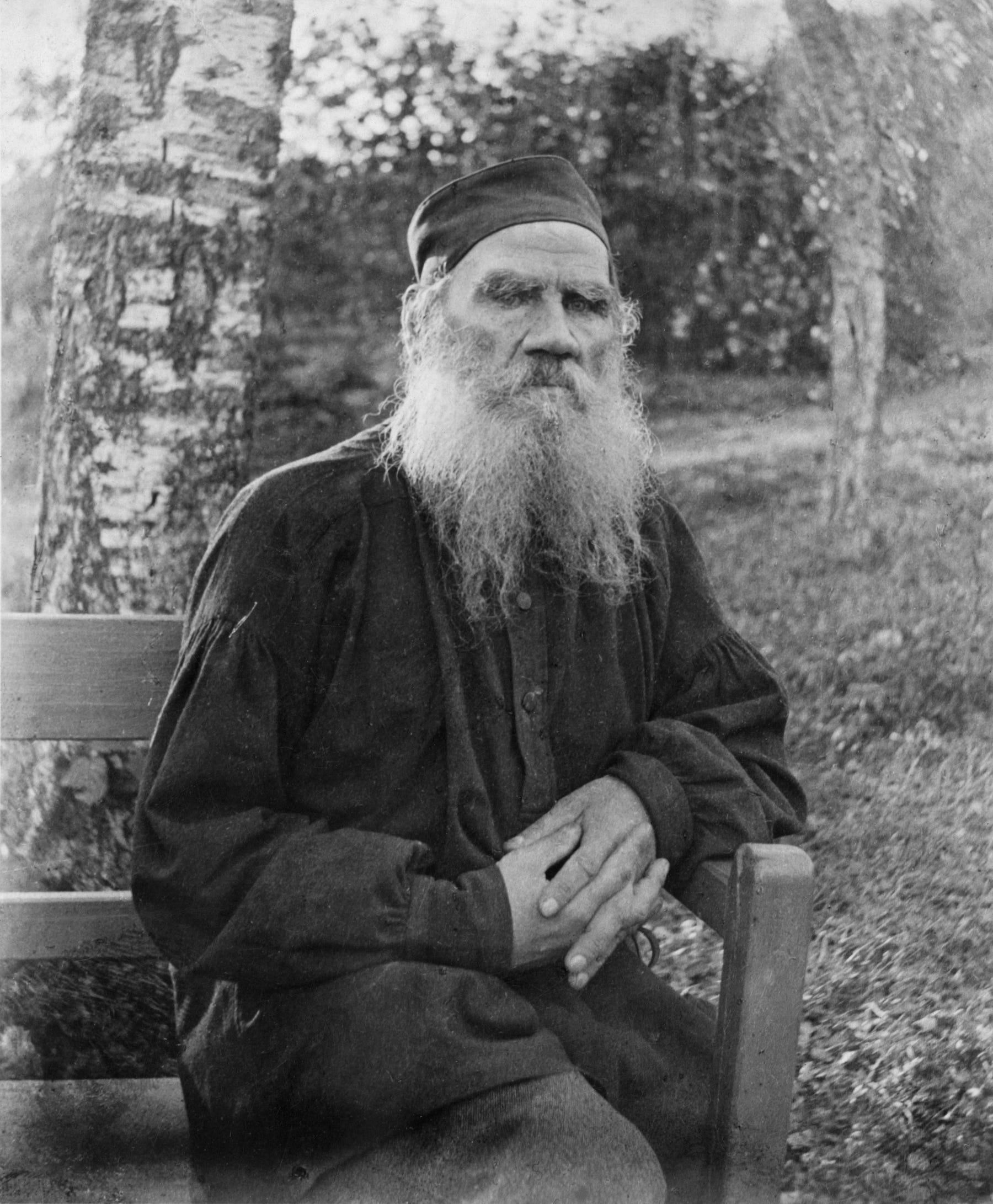
Russian author, master of realistic fiction and one of the world’s greatest novelists to ever live — best known for his work, War and Peace, shares his strategy on how to finally stick to your goals even if you don’t feel like doing anything.
“I must write each day without fail, not so much for the success of the work, as in order not to get out of my routine.”…. Then he, too came up to have his breakfast, for which he usually ate two boiled eggs in a glass. He did not eat anything after that until five in teh afternoon. Later, at the end of 1880, he began to take luncheon at two or three. He was not talkative at breakfast and soon retired to his study with a glass of tea. We hardly saw him after that until dinner.”
According to Sergei, Tolstoy worked in isolation — no one was allowed to enter his study, and the doors to the adjoining rooms were locked to ensure that he would not be interrupted.”
Mark twain:“I..write..in the same linen we make shirts of”
World renown Novelist and journalist, best known for The Adventures of Tom Sawyer (1876) and Adventures of Huckleberry Finn (1885) on how to find your own style of working daily.
His routine was simple: he would go to the study in the morning after a hearty breakfast and stay there until dinner at about 5:00. Since he skipped lunch, and since his family would not venture near the study — they would blow a horn if they needed him — he could usually work uninterruptedly for several hours.
“On hot days” he wrote to a friend, “I spread the study wide open, anchor my papers down with brickbats, and write in the midst of the hurricane, clothed in the same linen we make shirts of.”
Charles Dickens: “Dickens left his desk for a vigorous three-hour walk through the countryside or the streets of London”
Famous English novelist, widely considered as the greatest of the Victorian era. His best work includes such A Christmas Carol and A Tale of Two Cities. Below you’ll learn his daily routine and weird habits to refocus and generate new creative ideas.
Dickens’s working hours were invariable. His eldest son recalled that “no city clerk was ever more methodical or orderly than he; no humdrum, monotonous, conventional task could ever have been discharged with more punctuality or with more business-like regularity, than he gave to the work of his imagination and fancy.”
He rose at 7:00, had breakfast at 8:00, and was in his study by 9:00. He stayed there until 2:00, taking a brief break for lunch with his family, during which he often seemed to be in a trance, eating mechanically and barely speaking a word before hurrying back to his desk.
On an ordinary day he could complete about two thousand words in this way, but during a flight of imagination he sometimes managed twice that amount. Other days, however, he would hardly write anything; nevertheless, he stuck to his work hours without fail, doodling and staring out the window to pass the time.
Promptly at 2:00, Dickens left his desk for a vigorous three-hour walk through the countryside or the streets of London, continuing to think of his story and, as he described it, “searching for some pictures I wanted to build upon.” Returning home, his brother-in-law remembered, “he looked the personification of energy, which seemed to ooze from every pore as from some hidden reservoir.” Dickens’s nights, however, were relaxed: he dined at 6:00, then spent the evening with family or friends before retiring at midnight.
Jane Austen: “If visitors showed up, she would hide her papers and join in the sewing.”
English novelist, best known for penning the popular novels, Pride and Prejudice and Sense and Sensibility, shares her strategy for eliminating distractions and staying focused on the work in front of you.
Austen rose early, before the other women were up, and played the piano. At 9:00 she organised the family breakfast, her one major piece of household work. Then she settled down to write in the sitting room, often with her mother and sister sewing quietly nearby. If visitors showed up, she would hide her papers and join in the sewing. Dinner, the main meal of the day, was served between 3:00 and 4:00. Afterward there was conversation, card games, and tea. The evening was spent reading aloud from novels, and during this time Austen would read her work-in-progress to her family.
Anthony Trollope:”I require of myself 250 words every quarter of an hour…”
One of the greatest English novelist of the Victorian era, best-known for his works is a series of novels collectively known as the Chronicles of Dorsetshire. Trollope wrote 40+ books throughout his lifetime. His strategy is explained in Mason Currey’s book, Daily Rituals:
“It had at this time become my custom, — and is still my custom, though of late I have become a little lenient of myself — to write with my watch before me, and to require of myself 250 words every quarter of an hour…
This division of time allowed me to produce over ten pages of an ordinary novel volume a day, and if kept up through ten months, would have given as its results three novels of three volumes each in the year…”
Bernard Malamud: “Eventually everyone learns his or her own best way.”

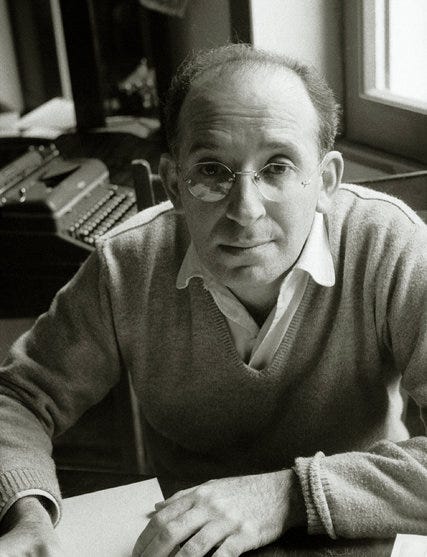
In a 1975 interview, Pulitzer Prize Winner, Bernard Malamud, one of the most prominent figures in Jewish American literature, sums up the truth behind finding your perfect daily routine.
You write by sitting down and writing. There’s no particular time or place — you suit yourself, your nature… Eventually everyone learns his or her own best way.
How to quickly use these in your life
Whether you’re an aspiring writer looking to publish the next world renown novel, an entrepreneur striving to be the next Steve Jobs or an ambitious professional looking to reach the top of your field — here’s how you can apply these daily routines for better mental and physical habits for success.
1. Commit to working every day
Leon Tolstoy made a firm committment to do something everyday, “I must write each day without fail, not so much for the success of the work, as in order not to get out of my routine”. Stephen King writes 6 pages and over 1000 words a day.
By being consistent every day or at least every other day, the pressure to create perfect work will be alleviated because you know it’s just another day’s work.
Don’t put too much pressure on the final outcome, just make a committment in writing and focus on working on your craft daily.
2. Tackle your most important thing first — in a workspace with minimal distractions.
There’s an interesting pattern in the daily routines of these famous writers. First, they all wake up relatively early in the morning, but, even more fascinating is that they block out the first three to seven hours of the day for focused, distraction free work.
Maya Angelou, for example, blocks out a time window from 7 a.m till 2 p.m to work productively before her day gets chaotic.
Jane Austen asked that a certain squeaky hinge never be oiled, so that she always had a warning when someone was approaching the room where she was working and avoid distractions. Rumour has it, that the Iconic writer at the centre of the Harlem Renaissance, Zora Neale Hurston, hired a man whose only job was to plug her ears while she typed to keep her environment quiet.
Either way, do whatever it takes to do the most important thing first and keep away from distraction. Hide your phone, lock yourself in an internet free room, drive to a local library — do whatever it takes to get in that zone.
This way you can avoid wasting your best hours of high energy, concentration and willpower on unproductive phone browsing and internet surfing.
3. Physically prepare yourself for the mental battle ahead.
Everyday, Murakami runs for 10 kilometers or swims for 1500m (or both) everday — in his words : “Physical strength is as necessary as artistic sensitivity”. Vonnegut did push ups and situps as a break from his writing routine. It’s like survival training in preparation for a battle.
The battle that takes place in our mind daily — the attachment to our work, an unwillingless to make necessary adjustments or the fear that people will laugh and think your work is stupid.
Find a physical activity that you can consistently stick to and push yourself outside your comfort zone with. This will help prepare you to aggressively and productively tackle the long hours of work or possibly rejection ahead of you.
4. Create a daily quota to meet.
Anthony Trollope describes his daily quota from his routine, “I write with my watch before me, to require of myself 250 words every quarter of an hour. I have found that the 250 words have been forthcoming as regularly as my watch went..” Alice Munro also held a strict daily quota to complete everyday.
Whatever number you choose, as with any big goal, it helps to break it down into manageable chunks.
Again, the most important thing to focus on is not the volume of work, but the consistency of work — 500 words only takes half an hour a day but over a year that’s approximately 182,500 words — the equivalent of 2 novels.
5. Take breaks at regular intervals.
Charles Dickens famously took three-hour walks every afternoon — and what he observed during them fed directly into his writing. Likewise, Alice Munro walks for three miles everyday to clear her head.
Taking some time off — from a few minutes up to an hour or more a day, can help you regain your energy and reveal new creative ideas for your work.
..Or as Hemingway puts it, “You write until you come to a place where you still have your juice and know what will happen next and you stop and try to live through until the next day when you hit it again.”
Final Thoughts
In the end, you are unique and there is no particular daily routine that will be a perfect fit for you. Experiment and stick to a strategy that works best for you. And remember this…
“If you show up for the muse consistently, then she will start showing up for you.”
But, it won’t be easy. Especially in the beginning, it can be a real struggle to stick with your new habits and avoid falling back to your old habits.
No matter how little progress you feel you’ve made so far, stick to something everyday and that tiny brick you lay today will one day become thousands of bricks — a castle.
The internet is noisy. Want to cut through the noise and and feed your brain with well-researched ideas for better habits? Join 10,000 smart, curious minds and get your brain food at The Smarter Brain newsletter.
Footnotes
- Credit to BrainPickings, OpenCulture and Mason Currey, who brought some of these stories to my attention.
This article was originally published on MayoOshin.Com as The Daily Routine of 20 Famous Writers (and How You Can Use Them to Succeed).

